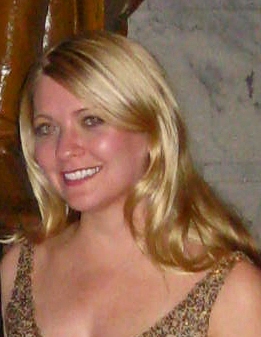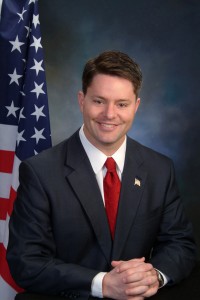By John Y. Brown III, on Wed Nov 5, 2014 at 12:00 PM ET  Last night, Kentucky served as our nation’s crucible for testing the political winds at the national level. Five term incumbent U.S Senator Mitch McConnell, with an unpopular President of the opposite party in the White House, seemed on the surface to have a significant advantage. But public fatigue and cynicism seemed to be conspiring against Sen McConnell and made his seat more vulnerable than any time in his 30 years in the Senate.
Many good Democrats passed on challenging Sen McConnell. But one had the courage of her convictions —and a great deal of both courage AND convictions. And despite being a relative newcomer to Kentucky statewide politics, Alison Lundergan Grimes, had that special and indefinable quality. That “X” factor that makes people believe –and want to believe — more in her and her ability than her resume might suggest possible.
I was one of those people. I proudly supported Alison Lundergan Grimes and am proud —so proud– of the race she ran. She took on the most daunting political race in the entire United States of America this year and said, “Yeah, I want to take on this challenge. And I’m ready.” And she was as ready–more ready –than her harshest detractors ever imagined.
She fought the good fight for the right reasons –not because it was the “smart thing to do” but because it was what she felt compelled to do. People like Alison impress me. They run for the U.S Senate against the most powerful Senator in the nation and make the race the political touchstone for our nation. But that’s not why people like Alison Lundergan Grimes impress me. They impress me because people like Alison Lundergan Grimes change the world. She did a little bit this year. Almost a whole lot. And she will continue to change the world and make it a little bit better next year. And the year after that. And the year after that.
She is special and we all — especially all democrats in our state (and nation) owe her a great debt of gratitude tonight. I take my hat off to her to her. And I don’t even wear hats. Well done, Alison.
But Alison didn’t lose. Really, in my view, Sen Mitch McConnell won. No one is particularly fond of the deluge of non-stop political ads that is the battle field on which our political races these days are largely fought and determined. But both candidates did much more and gave up blood, sweat, toil and tears far greater than those silly commercials would ever indicate. This US Senate race was, on every conceivable level, one for the ages.
If this race started as largely a question as to whether 30 year incumbent Senator McConnell still had the fire in his belly, the answer by the time the polls opened this morning was a resounding and unequivocal yes! In fact, by September whether the “fire in the belly” still existed was no longer in dispute. It was now a question of whether it would become a conflagration. And looking at the vote totals tonight, I would say it did.
And congratulations to Sen McConnell on winning a record Kentucky six term tonight.
Elections settle things. Sort of. They sometimes feel in the heat of a campaign like an epic battle of good versus evil (depending on your party). But they aren’t really. They are usually two very talented, driven people of both integrity and goodwill who have very different ideas of how to solve the problems that face our nation, state or community. And only one can win.
Last night Senator McConnell won –again. And my nonexistent hat is tipped most respectfully to him. Well done, Senator. I may not have voted for you. But this campaign —and especially tonight — you earned my respect, again, and I wish you all the best as you start your sixth term —and I expect you to fight the good fight, in your own way as you earned the right to do so tonight, and fight for the state we both love deeply along with about four-and-a-half million other Kentuckians.
So, political races are about decisions. About endings. And about new beginnings.
And although elections seem mostly to be about the candidate who run for office, they are much more about us, the voting public.
A hard battle was waged and fought –and fought hard –and tonight we have a victor. And the voters, campaign workers, citizen activists, poll workers and politically indifferent citizens all —all have a newly elected US Senator.
In boxing, a sport we know a thing or two about in Kentucky, when the final bell of the last round rings the two gladiators lumber toward each other and hug and congratulate each other as a sign of mutual respect. The boxing audience, though still cheering for their favorite boxer, feels that same mutual respect. Likewise, political opponents do much the same thing on Election Day. And so should we the voters tonight.
Time to clear off our stadium seat, throw away our soft drink and bag of peanuts, put on our overcoat and head for the parking lot to find our car. And head home.
Until next time.
By Jonathan Miller, on Wed Nov 5, 2014 at 10:00 AM ET  Now that the ballots have been counted and the concession speeches have been delivered, it’s time to rest those campaign-weary feet and kick back for that age-old tradition: the post-election martini. Whether your candidates of choice emerged triumphant or disappointed, we can all breathe a sigh of relief at the end of another grueling election cycle. There were highs and lows, from inspiring policy ideas to soul-depleting ads. Nonetheless, it is always an affirming sight to see friends and neighbors lining up to put their thoughts into action on Election Day. Now that the ballots have been counted and the concession speeches have been delivered, it’s time to rest those campaign-weary feet and kick back for that age-old tradition: the post-election martini. Whether your candidates of choice emerged triumphant or disappointed, we can all breathe a sigh of relief at the end of another grueling election cycle. There were highs and lows, from inspiring policy ideas to soul-depleting ads. Nonetheless, it is always an affirming sight to see friends and neighbors lining up to put their thoughts into action on Election Day.
You should take this opportunity to have a bit of a breather. Before the next flurry of debates, ads, and fundraisers begins (probably much sooner than we’d all like), take a little time to sit, reflect, and enjoy a rejuvenating treat. For that, may I suggest the Moonshine Martini, a bracing refreshment. Whether you’re taking a victory lap or need a nip of comfort, this taste of Appalachia combines rural and urban elements as a reminder of the enduring power of both constituencies.
If your style of imbibing lies along the sweeter lines, I have something for you as well. In the spirit of fall, try this ginger cake. The fragrant spices will soothe the senses, and the ginger will settle your stomach from the nausea-inducing spin. So kick back and give a “cheers” to surviving another political season; you’ve earned it.
Moonshine Martini
Ingredients:
3 ounces (1/4 cup) clear corn whiskey
1 teaspoon dry Madeira, dry sherry, or dry vermouth
1 pinch of kosher salt
3 boiled peanuts or 1 pickled onion for garnish (optional)
Directions:
- a) Combine the whiskey, Madeira, and salt in a cocktail shaker filled with ice cubes, and shake vigorously for 10 seconds.
- b) Strain the cocktail into a chilled martini glass and garnish with the peanuts, if using.
(Source: The Lee Bros. Charleston Kitchen by Matt Lee and Ted Lee)
Ginger Cake
Ingredients:
1 stick unsalted butter, at room temperature, plus a little extra for the pan
2 1/2 cups of all-purpose flour
1 tablespoon of ground ginger
1 1/2 teaspoons of ground cinnamon
1/4 teaspoon of ground cloves
1/2 teaspoon of kosher salt
1 tablespoon of baking powder
1 1/2 cups of boiling water
1 cup unsulfured light molasses
1 teaspoon of baking soda
1 packed cup of dark brown sugar
1 large egg
1/4 cup finely grated fresh ginger
Special Equipment:
A stand or handheld electric mixer
an 8-inch springform pan about 3 inches deep
an 8-inch circle of parchment paper
Directions:
- a) Preheat the oven to 325 degrees Fahrenheit, and position a rack in the middle. Grease the springform pan very well with butter. Line the bottom of the pan with the parchment paper circle, and put the pan on a baking sheet.
- b) Sift the flour, ground ginger, cinnamon, cloves, salt, and baking powder into a medium bowl and stir well. In a small pot, stir together the boiling water, molasses, and baking soda until the molasses has completely dissolved.
- c) Put the butter and sugar in the bowl of a stand mixer fitted with the paddle attachment. (Alternatively, you can use a handheld electric mixer.) Mix on high speed until the mixture is light and fluffy, about 3 minutes. Occasionally, scrape down the butter and sugar that clings to the sides. Reduce the mixer speed to medium-low, add the egg, and mix until incorporated. Then add the grated ginger and mix some more.
- d) Add about one-third of the flour mixture to the butter mixture and mix on low speed until well combined. Do the same with about one-third of the molasses mixture, and repeat the process until you’ve used up both mixtures. Stop the mixer from time to time to scrape down the sides of the bowl.
- e) Pour the batter into the springform pan and place the baking sheet (pan and all) into the oven. Bake just until a cake tester inserted into the center of the cake comes out almost clean and no longer wet, about 1 hour. Before you remove the ring of the springform, let it cool a bit.
(Source: A Girl and Her Pig by April Bloomfield)
By Lauren Mayer, on Wed Nov 5, 2014 at 8:30 AM ET In this hyper-partisan era, many writers wax nostalgic about when politics were more civil, when Tip O’Neill and Ronald Reagan could work together despite their differences, when people disagreed politely. That’s the great thing about nostalgia – you only have to remember the good parts (like how I love 1930s clothes and music but wouldn’t want to restore that era’s sexism, racism, or economic inequity). Likewise, there was plenty of political ugliness in the past – but I do think the op ed pieces have a point, in that these days we have lost even the superficial veneer of civilized disagreement.
With that in mind, this week’s song is a hybrid of my own admitted fierce partisanship and an effort to emulate the 1930s, by adopting the gracious tone and witty wordplay of a Noel Coward song. I may be totally one-sided here, but at least I can do it with grace and style!
By Rod Jetton, on Tue Nov 4, 2014 at 3:49 PM ET  While walking driving the highway one day an old Senator was tragically hit by a semi-truck and died. While walking driving the highway one day an old Senator was tragically hit by a semi-truck and died.
Surprisingly, his soul arrives in heaven and is met by St. Peter at the pearly gates.
“Welcome to heaven,” says St. Peter. “Before you settle in, it seems there is a problem. We seldom see a powerful politician around these parts, you see, so I’m not sure what to do with you.”
“No problem, I understand,” says the Senator. “Just go ahead and let me in.”
“Well, I’d like to, but I’ll have to check with Jesus first and see what to do about what you.” After checking with Jesus St. Peter retuned and said, “What we’ll do is have you spend one day in hell and one in heaven. Then you can choose where to spend eternity.”
“Really…? I’m awfully confident that I want to be in heaven,” says the Senator.
“I’m sorry, but we have our rules.”
“But I’m sure I want to go to heaven!”
“I understand, but first you have to spend twenty four hours in each.”
And with that, St. Peter escorts him to the elevator and he goes down, down, down to hell.
The doors open and the senator walks out into the middle of a beautiful green golf course. In the distance is a magnificent clubhouse and standing in front of it are all his friends and other politicians who had worked with him in politics.
Everyone is so happy and in elegant tuxedos and evening gowns. They run to greet him, shake his hand, and reminisce about the good times they had while getting rich at the expense of the people. They played a friendly game of golf and then dined on lobster, caviar and the finest champagne.
Also present is the devil, who really is a very friendly guy having a good time dancing and telling the funniest stories. They are all having such a good time that before the Senator realizes it, his twenty four hours were up and it is time to go.
Everyone gives him a hearty farewell and waves goodbye while the elevator rises…
The elevator goes up, up, up and the door reopens in heaven where St. Peter is waiting for him, “Now it’s time to visit heaven.”
So, twenty four hours passed with the Senator joining a group of contented souls moving from cloud to cloud, playing the harp and singing all the old time hymns. They were having a very good time and before he realizes it, the twenty four hours have gone by and St. Peter returns.
“Well, then, you’ve spent a day in hell and another in heaven. So where do you want to spend eternity.”
The Senator reflects for a minute, then he slowly muttered: “Well… I would never have thought I would say this, I mean, umm… heaven has been delightful, but hell was a whole lot better than I expected it to be and all my friends were there… so I think, umm… I would be better off in hell.”
Without saying a word St. Peter escorts him to the elevator and he goes down, down, down to hell.
Now as the doors of the elevator open he’s in the middle of a barren land covered with waste and garbage. He sees all his friends, dressed in rags, picking up the trash and putting it in black bags as more trash falls from above.
The devil comes over to him and puts his arm around his shoulders and says, “Congratulations you made it!”
As the Senator looked around he stammered, “I don’t understand… yesterday I was here and there was a golf course and clubhouse, and we ate lobster and caviar, drank champagne, and danced and had a great time. Now there’s just a desert wasteland full of garbage and my friends look miserable. What… what happened?”
The devil smiles at him, takes a puff on a big fat cigar and says, “Yesterday we were campaigning …
But today, you voted.”
Vote wisely today!
By John Y. Brown III, on Tue Nov 4, 2014 at 12:00 PM ET
 Things to do before I die… Things to do before I die…
Finish scraping off the sales sticker on the coffee maker in my office that I bought on clearance almost 5 years ago.
But not today.
Maybe next week. Or in November.
===
 Funerals got invented, I suspect, because years ago a group of people couldn’t be content saying “I don’t know what we should do now.” after somebody died. Funerals got invented, I suspect, because years ago a group of people couldn’t be content saying “I don’t know what we should do now.” after somebody died.
So one of them made up the idea of a funeral.
And here we are. Probably not a bad idea. But funerals will always feel to me like we still really don’t know what we should do or say.
By Jonathan Miller, on Tue Nov 4, 2014 at 9:28 AM ET  Hey, I wanted to let you know what I am hearing. There is a lot of buzz in the air that it’s heavy in the suburbs. Or the cities. Or both. Hey, I wanted to let you know what I am hearing. There is a lot of buzz in the air that it’s heavy in the suburbs. Or the cities. Or both.
But I think it’s going to come down to who is able to get their vote out, because the only poll that matters is on Election Day. Or what the people are telling me on the street. Or both.
I think this weather is really going to help the Republicans with their GOTV. Or the Democrats. Or both.
And I don’t believe the polls anyway, because I’ve never been polled. And the polls are all slanted toward the Democrats anyway. Or the Republicans. Or both.
So I think the winner is likely to be the candidate who gets more votes with early, absentee, in person, and intergalactic votes counted. Or all of them.
So happy cliche day. Or Election Day. Or both.
UPDATE (4:22 PM):
I hear the exits are showing that the Republicans are winning in a number of places. In other news, Democrats are also winning in certain places. But the independents are trying to pull off some places other than those.
It’s going to be a long night. We may be counting votes into tomorrow.
By Erica and Matt Chua, on Tue Nov 4, 2014 at 8:30 AM ET I love weddings, so when we got the invitation to attend our friend’s Indonesian wedding we couldn’t pass up the opportunity, considering we would be in Asia anyway. We arrived in Jakarta happy to see the familiar faces of friends Adrianne and Tom. However, with all the details of an Indonesian wedding, they were busy much of the time with rehearsals and last minute preparation. Lucky for us we were welcome to tag along for a first-hand cultural experience, one I couldn’t resist.
All the planning paid off, as the three-day event was beautiful, steeped in tradition and symbolism; providing a crash course in all things Javanese. The bride and groom and the groom’s family, whom live in Jakarta were incredible hosts. The extravaganza started with a welcome dinner where the guests were given gifts, swords for the men and jewelry for the women. The flavorful food, amicable guests and delicious food set the tone for the next two days.
Siraman: Bathing Ceremony

Tom and Adrianne anxiously awaiting the bathing ceremony to begin, cleansing them in preparation for marriage
The festivities got under way on day two with a traditional bathing ceremony known as Siraman. This ceremony is meant to cleanse the bride and groom both physically and spiritually to prepare them for the bond of marriage. With Adrianne and Tom dressed in traditional Javanese batik and draped in jasmine flowers, which smelled lovely. Nine family members are chosen to pour ladles of water over their heads. The water used in the ceremony is collected from different sites of familial importance making the ceremony very specific to the bride and groom. I couldn’t resist snapping pictures of the surprised expressions resulting from cold water being poured over their heads.

Tom and Adrianne being cleansed during the bathing ceremony
Ijab: Signing of Wedding Documents
The wedding day itself consisted of two consecutive ceremonies, the first of which is the Ijab, the official signing of documents. The bride and groom, father-of-the-bride, witnesses and the Imam (religious officiate) are all seated at a table for the transaction between the bride’s father and her future husband. Much of this ceremony was just between the families as dowry was discussed and everyone exchanged handshakes. Lucky for Tom, Adrianne excepted his dowry and did not ask for more even when prodded jokingly by the Imam. It was fascinating to watch and culminated with the signing of the marriage documents and exchange of rings, similar to a ceremony in the U.S. without any official declaration or kiss.

The signing of the official wedding documents known as Ijab takes place at a table with the family, imam and witnesses
Read the rest of…
Erica and Matt Chua: A Wedding to Remember
By John Y. Brown III, on Mon Nov 3, 2014 at 12:00 PM ET  This is my facial expression that I just had to use at Starbucks which says, “Would you please hurry heating up my Michigan Cherry Oat Bar because I am running late for my meditation meeting.” This is my facial expression that I just had to use at Starbucks which says, “Would you please hurry heating up my Michigan Cherry Oat Bar because I am running late for my meditation meeting.”
This is not an easy message to communicate and is a nuanced combination of “East end haggard bad ass” and “New agey metrosexual hungry.”
But I think I pulled it off.
By Saul Kaplan, on Mon Nov 3, 2014 at 8:30 AM ET  This is the fifth of a series of conversations originally published on the Time website , authored by myself and Nicha Ratana, with transformational leaders who will be storytellers at the BIF10 Collaborative Innovation Summit in Providence, RI, on Sept. 17-18. This is the fifth of a series of conversations originally published on the Time website , authored by myself and Nicha Ratana, with transformational leaders who will be storytellers at the BIF10 Collaborative Innovation Summit in Providence, RI, on Sept. 17-18.
Richard Saul Wurman, best known as the founder of the TED conference, has made it his job to produce clarity out of the complex. In Newport, RI, lives an old magician in splendid, self-imposed exile.
His eclectic body of work boasts over 80 books, including the original Access city guides, the bestsellers Information Anxiety and Information Anxiety II, as well as esteemed companions on all topics from football, to estate-planning, to healthcare. He has founded 40-odd conferences and chaired numerous information-mapping projects.
In conversation, Wurman speaks with unapologetic honesty, which one comes to appreciate. He has light eyes and a hawk-like profile. He describes himself as “abrasive, but also charming.”
Wurman lives with his wife in a 19th-century mansion on eight high-walled acres. They have few friends in Newport. He admits they prefer it that way. “I live reclusively behind a fence,” he jokes, “The town put it up to keep me in.”
Outside of Newport, Wurman is someone who enjoys what the New York Times describes as “a happy notoriety as a connector and king-maker.”
“My interests are only apparently varied,” he claims. “I’m Johnny-one-note. My passion is less the subject, and more the patterns. Everything connects and can be mapped, and the mapping of that is fascinating to me.”
Of his business philosophy, Wurman says he sees “every book, every conference, every design” as an experiment on how he can get people closer to “telling the truth.”
When asked about how he developed his mission, Wurman reflects on his college days. He had been an accomplished student of architecture at the University of Pennsylvania, graduating with the highest honors. Despite this success, he eventually came to realize that he “didn’t actually understand anything.” He claims, “I realized that just because somebody told me something, it doesn’t mean I understood it. And that was terrifying.”
“I’m not very bright intellectually, but I’ve decided to not by humiliated by my ignorance,” he says. “What a joy it is, to really not know something and slowly fill it in with things you understand!”
Wurman claims to be consistently self-serving.
“I use myself as the basis,” he says. “Every time, it’s a journey from me not knowing, to knowing about something.” Nor does he believe in complicating his goals by worrying over how people will receive his projects. “If you try to have that effect, it affects your own work. I don’t want to change my work. I already have a client. That client’s me.”
His latest project is Urban Observatories, a permanent exhibit in the Smithsonian (complete with its own app), dedicated to providing an intuitive platform to compare live-population trend maps of major cities.
“I’m just trying to understand things,” he says, “I’m not trying to change the world.”
Yet he acknowledges that the implications of the project are immense. From enabling governments to make use of the failures and successes of other cities, to helping families decide where to take root and companies where to relocate, Wurman’s project explodes the potential of comparative cartography by conducting its study on an unprecedented scale.
Richard Saul Wurman coined the term “information architect” to describe his particular set of talents.
It is easy to see how his architectural background continues to influence his work. Wurman’s projects deal deftly with questions of experience design, structural integrity and intention and result.
The 18-minute TED Talk had been his answer to question of how to deliver the “Next Big Idea” in an age pressed for time. He sold TED in 2002, after which, he claims, the conference began editing talks and using teleprompters, a practice Wurman finds appalling. ”
In 2004, Wurman advised his friend Saul Kaplan as Kaplan’s nonprofit, The Business Innovation Factory (BIF) in Providence, RI, was designing its first annual Collaborative Innovation Summit. As Wurman mentored Kaplan, they worked by subtracting from the usual style of business conferences.
They eliminated the podium and numerous projection screens in favor of a simple, well-lit stage. There was no dress code; “I don’t own a suit,” Wurman says. They requested from their speakers personal stories of transformation, not speeches or pitches.
Wurman looks forward to returning to the BIF Summit in September. The summit, he claims, “unequivocally attracts smart individuals who tell a fresh story about their passions, ideas and failures.” He adds, “Looking in the gray area between these stories is where good, inspiring concepts will arise.”
Wurman shares his secret to hosting a good conference: “Have a dinner party,” he says. “Invite people you’re interested in and have conversation with them.”
The BIF Collaborative Innovation Summit combines 30 brilliant storytellers with more than 400 innovation junkies in a two-day storytelling jam, featuring tales of personal discovery and transformation that spark real connection and “random collisions of unusual suspects.”
|
The Recovering Politician Bookstore
|
 Last night, Kentucky served as our nation’s crucible for testing the political winds at the national level. Five term incumbent U.S Senator Mitch McConnell, with an unpopular President of the opposite party in the White House, seemed on the surface to have a significant advantage.
Last night, Kentucky served as our nation’s crucible for testing the political winds at the national level. Five term incumbent U.S Senator Mitch McConnell, with an unpopular President of the opposite party in the White House, seemed on the surface to have a significant advantage. Last night, Kentucky served as our nation’s crucible for testing the political winds at the national level. Five term incumbent U.S Senator Mitch McConnell, with an unpopular President of the opposite party in the White House, seemed on the surface to have a significant advantage.
Last night, Kentucky served as our nation’s crucible for testing the political winds at the national level. Five term incumbent U.S Senator Mitch McConnell, with an unpopular President of the opposite party in the White House, seemed on the surface to have a significant advantage.
















